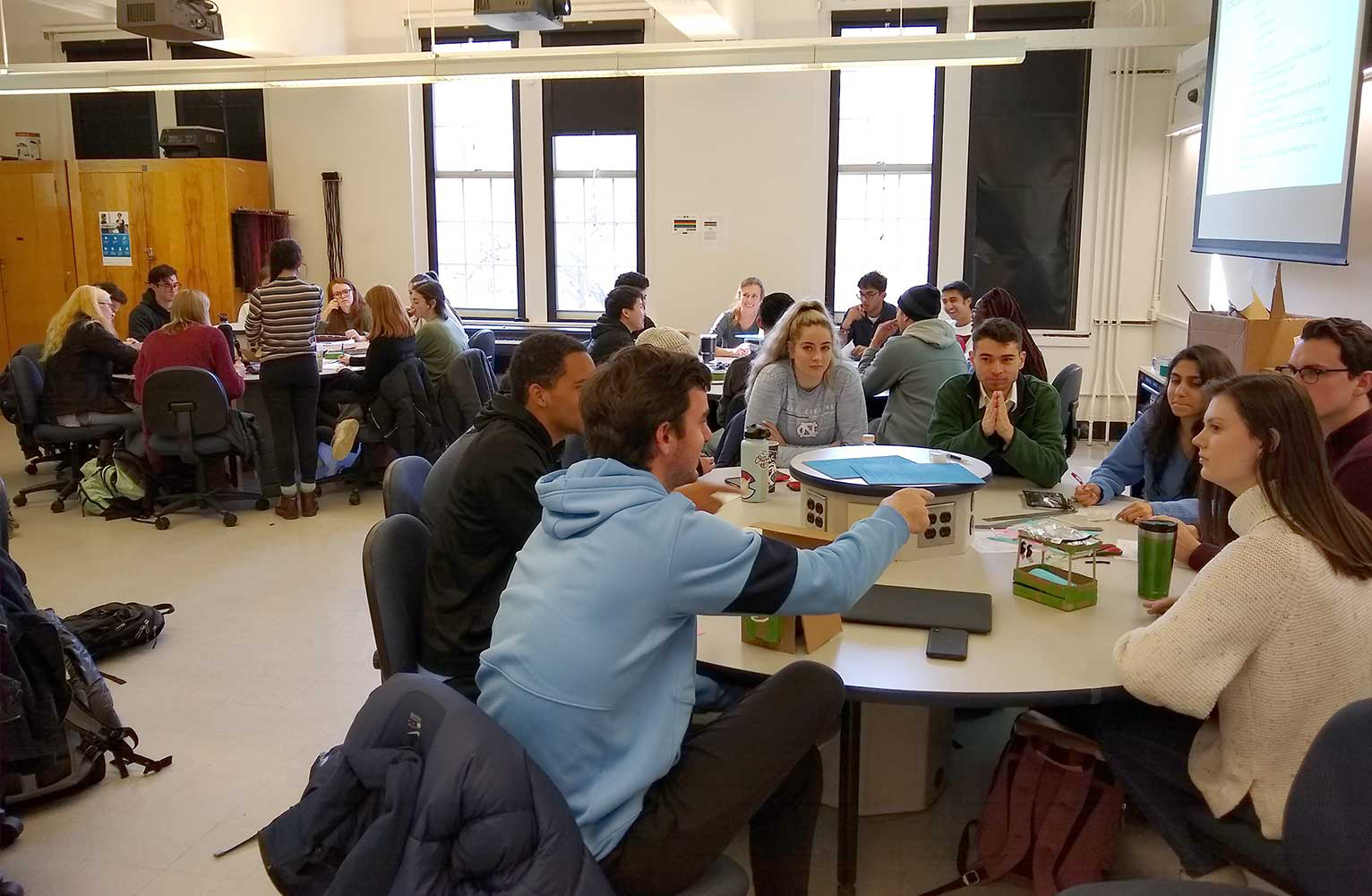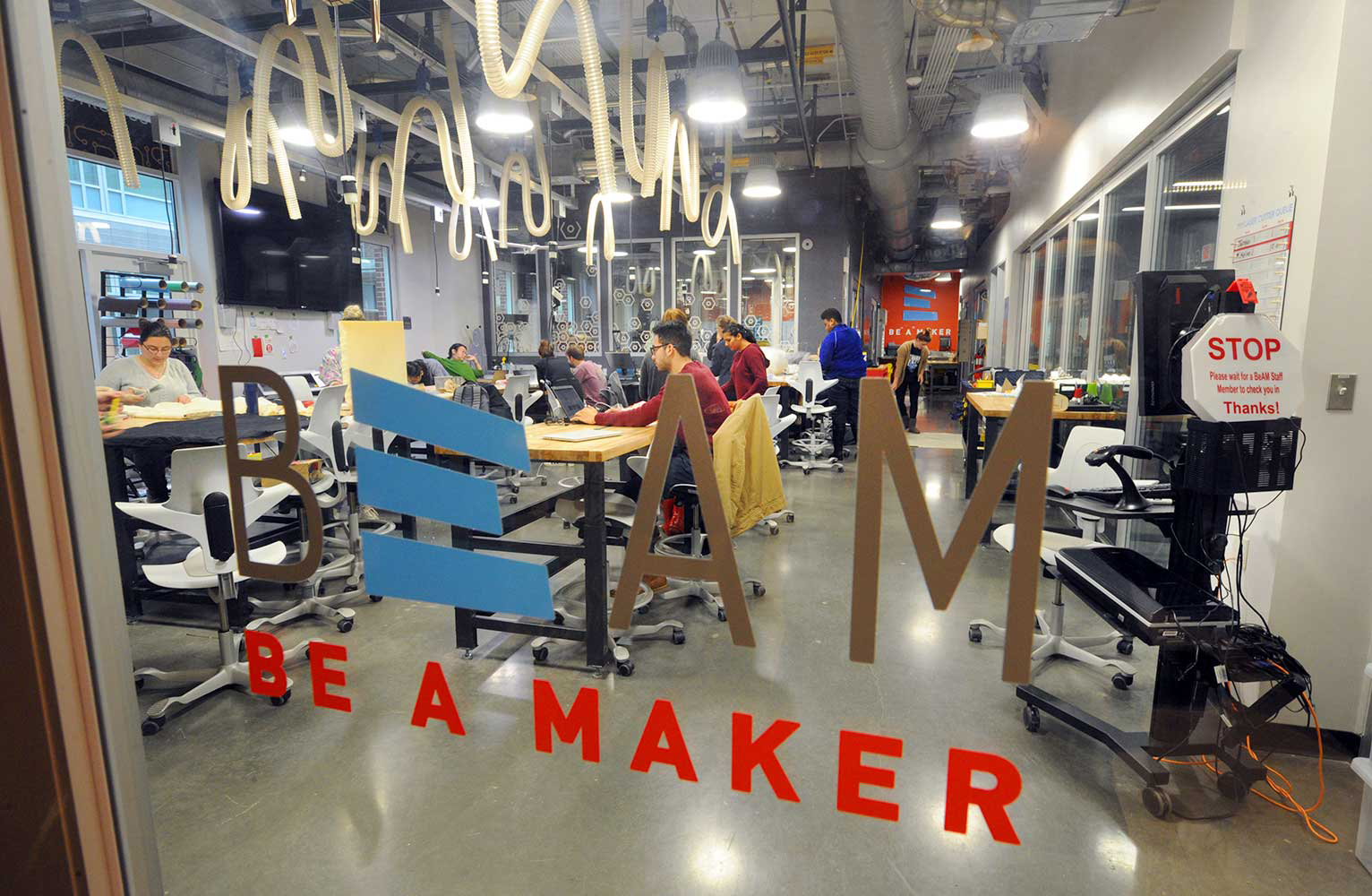Applied physical sciences receives grant to promote an entrepreneurial mindset in undergraduates.

The University of North Carolina at Chapel Hill is excited to become the newest partner in the Kern Entrepreneurial Engineering Network, or KEEN — an expanding network of universities across the United States with a shared vision of equipping engineers with an entrepreneurial mindset so they can create personal, economic and societal value through a lifetime of meaningful work.
UNC-Chapel Hill joins the ranks of 48 partner institutions in KEEN, including nearby partners Duke University, Wake Forest University and Campbell University.
Along with an invitation to join KEEN, the Kern Family Foundation awarded a nearly $600,000 grant to the applied physical sciences department to support the design and launch of a new undergraduate program that is infused with an entrepreneurial mindset. This initiative is led by Richard Goldberg, teaching associate professor in applied physical sciences (APS). With this new undergraduate program, APS has an opportunity to design a full slate of individual courses that promote the entrepreneurial mindset, as well as the overall framework that connects the courses into a coherent, unified student experience. The grant also supports an annual workshop for institutions from around the country that are interested in incorporating the entrepreneurial mindset into their new engineering programs. The workshop will be hosted by UNC-Chapel Hill and facilitated by the Olin College of Engineering.

“We are excited to partner with UNC-Chapel Hill as they create their student-focused engineering program. Graduates from this program will have a desire for life-long learning, the ability to derive unique insights from that learning and the mindset to identify opportunities to apply those insights to create value for themselves, the economy and society as a whole,” said John Heathcock, senior program director for entrepreneurial engineering at the Kern Family Foundation.
“This partnership with UNC-Chapel Hill will enable numerous opportunities to benefit KEEN and the entire U.S. engineering ecosystem. This is a highly influential institution with interest in ethics and character and a strong desire to share their work across many platforms. We are excited about the opportunity to see entrepreneurially minded learning (EML) embedded in a new engineering program, leveraging the Quality Enhancement Plan structure in place to bring EML to the APS faculty at Chapel Hill, and the launch of the annual EMERGE workshops to broaden KEEN’s reach.”
As a KEEN partner, Carolina will have access to exclusive benefits that expand and improve undergraduate education on campus to promote the development of an entrepreneurial mindset. KEEN provides a national platform for faculty to share relevant best practices, course content modules and pedagogical innovations. Benefits include opportunities for faculty development and access to curriculum resources and grants. With 52% of Carolina’s 19,000 undergraduate students majoring in STEM fields, the impact of these benefits will reverberate throughout campus.
“The KEEN pedagogy on entrepreneurial mindset, along with its emphasis on curiosity, connections and creating value, provides me with an inventive new process to achieve my primary course goal — fostering the skillsets my students must have to excel in a modern, forward-thinking and collaborative workforce,” said Stefan Jeglinski, teaching assistant professor in physics and astronomy, who participated in the first KEEN Faculty Learning Community.
The applied physical sciences department is a natural fit for this initiative. The department lives in the collaborative space between science and engineering, combining knowledge and discovery with an entrepreneurial mindset and team-based research and innovation to address real-world problems. Organized around “Ideas to Impacts,” the department unites campus themes in health, water and energy to help Carolina continue to be a leader in scientific innovation and create solutions that will have worldwide impact.
Recently, for example, BeAM@CAROLINA, a network of makerspaces on campus operated by the applied physical sciences department, was at the forefront of manufacturing 41,500 face shields for health care workers fighting the COVID-19 global pandemic.
“UNC-Chapel Hill has made a pledge to be ‘strategic, bold and student focused,’ and we have implemented this vision with initiatives that promote EML to transform undergraduate education at UNC,” said Terry Rhodes, dean of the College of Arts & Sciences. “This makes KEEN a natural fit for our university and the department of applied physical sciences, which seeks to apply scientific discovery to real-world challenges, creating lasting value for our society. Through our relationship with KEEN, we are excited to build on our existing foundation to educate students who are prepared for the 21st-century workforce.”
“We are creating a new program that combines a curiosity-driven approach with the design of disruptive solutions, all within the Carolina culture of liberal arts and innovation. We are thrilled to join KEEN and work with other KEEN partners with this shared purpose,” said Rich Superfine, Taylor-Williams Distinguished Professor and chair of the department of applied physical sciences.
“‘Introduction to Design and Making (APPL110)’ challenged me to look at my educational experience through a different lens, taught me to see failure as an asset and gave me the technical knowledge I need to grow as a student and design-thinker,” said Katie Forester ’21, a quantitative biology major and chemistry and statistics and analytics double minor. “Thanks to APPL110 and the makerspace at UNC, I was able to create my own start-up venture that recently got accepted into an accelerator program with Launch Chapel Hill.”
As one of the leading global research universities in the country — ranking fifth in federal research funding among all U.S. universities — UNC-Chapel Hill is known for innovative teaching, research and public service. Every day, faculty, staff and students shape their teaching, research and public service to meet North Carolina’s most pressing needs in every region and all 100 counties.
About The Kern Family Foundation: The Kern Family Foundation invests in the rising generation of Americans, equipping them to become tomorrow’s leaders and innovators. Established in 1999, the Foundation is based in Wisconsin and invests in the rising generation of leaders. The Foundation aims to effect systemic change through partnerships to preserve the tradition of private enterprise. Its three program areas are Education and Character; Faith, Work and Economics; and Entrepreneurial Engineering.
